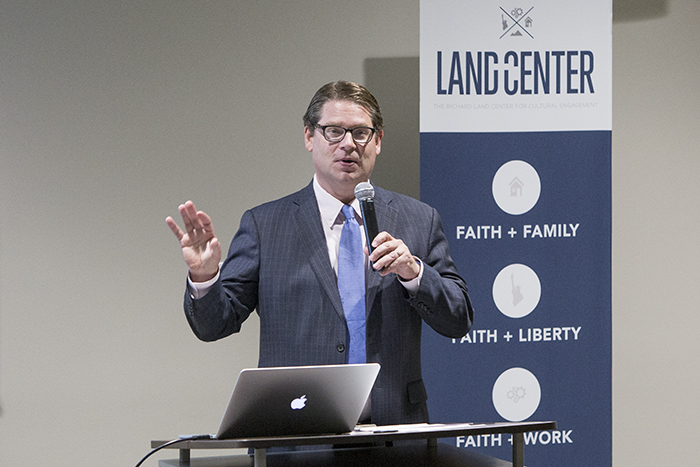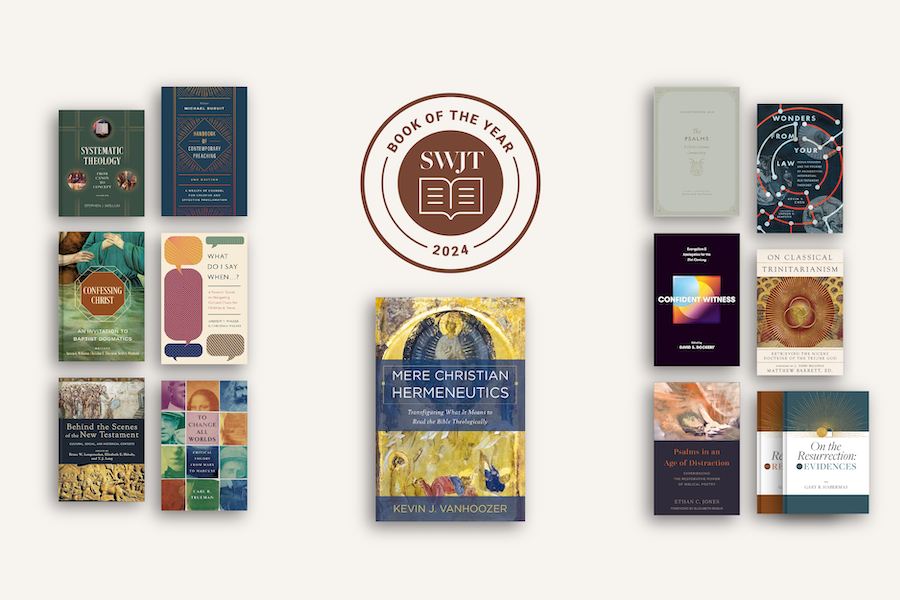Religion is strengthening marriage and families, sociologist finds

Are marriages rooted in religion a pathway to a fulfilling and stable life, or encouragement for domestic violence? Studies indicate that marriage is consistently lending stability and a positive direction to society, says a family-focused sociologist.
Bradford Wilcox, professor of sociology at the University of Virginia, studies marriage and its sociological and political implications as director of the university’s National Marriage Project. His three-part lecture series, “Focused on the Family,” was the fall semester’s inaugural Land Center lecture series at Southwestern Seminary, Oct. 19-20.
At his main talk in Mathena Hall’s Draper Auditorium, Wilcox shed light on how faith impacts the society in which we live. His research findings, he said, indicate that religion strengthens both families and society.
He recalled that this summer, an Australian scholar asked him to weigh in on a story that had dominated the news there, which suggested that the church is not only failing to address domestic violence, but is enabling and concealing it. ABC News in Australia reported that “countless stories” existed of spouses who were abused at the hands of their husbands, who “twisted Scripture” to support their abuse, and pastors who told wives to submit and endure abuse.
“They were painting a damning portrait of religion’s role,” Wilcox said. Even more distressing, he added, the report is likely “a harbinger of media reports to come” that suggest that evangelical ideals are harmful. He cited a Chicago study that suggested that religious children are less altruistic than others, reported with headlines like “Are religious children more selfish?”
“These kinds of messages are going to become more common here and globally,” he said. “I think what’s happening is that religion’s ties to traditional morality and, yes, to politicians like Donald Trump have made people more susceptible to skepticism. So be prepared for more of these kind of studies and these kinds of claims.”
Yet his own research indicates that those headlines do not tell the whole story, Wilcox said. “Paradoxically, in some ways, evangelical men are more likely to have their hearts and minds turned toward their families,” he said. He cited examples of men who became closer to their families after accepting Jesus as their Savior. They saw a marked improvement in the quality of their marriages, experienced more temperance and a sense of hope, and learned how shared faith can help a couple deal with challenges.
“According to U.S. statistics, across the board, couples who attend church tend to be steering away from domestic violence,” he said. “Also, people who attend are 30 percent less likely to be divorced.” Numerous studies have found that evangelical Protestant men have the lowest levels of domestic violence here in the United States, and their wives scored higher in their happiness. The ABC story looked at only one piece of research, Wilcox said. “If you look at the bottom line of evidence in the United States, it looks like religion is a force for good.”
Evangelical Protestant family life tends to be stable because family activities promote spending time with one another, Wilcox said. His research also indicates that praying together as a couple is a great predictor of a high-quality marriage. European studies have indicated that evangelicals, as opposed to Catholics or Jews, have a stronger sense that their faith is linked to their family life and a stronger sense that religion is guiding their approach to life, and generally are more focused on the welfare of their families.
“They’re maybe more interested in getting their kid into heaven than getting their kid into Harvard,” Wilcox said. In regard to the Australian ABC report, Wilcox said that while individual cases of abuse and malfeasance exist, “we can see that on average, religion is encouraging men to turn their hearts and minds, in good ways, toward their families.”



